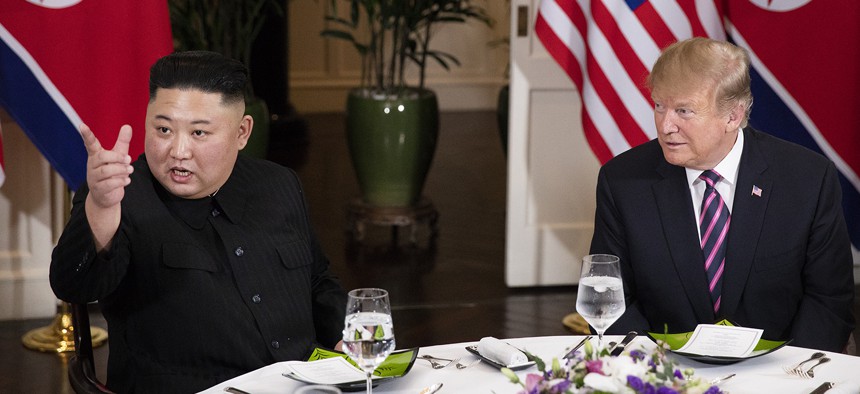
Trump and Kim meet in February in Vietnam. Joyce N. Boghosian/White House
Trump Sides With North Korea Against the CIA
The president responded to reports that Kim Jong Un’s brother had been an American asset by reassuring the strongman he would not allow such spying in the future.
For the second time in two weeks, President Donald Trump interrupted a busy schedule of trashing Joe Biden to say nice things about the North Korean dictator Kim Jong Un.
But Trump’s decision, during remarks in Japan in May, to side with Kim over Biden was a brazen but unsurprising violation of the tradition that “politics ends at the water’s edge,” whereas his comments today were far more baffling.
Two accounts, a new book by the Washington Post reporter Anna Fifield and a Wall Street Journal story, report that Kim’s brother Kim Jong Nam was a CIA informant. Kim Jong Nam was killed in a shocking chemical-weapons attack in the Kuala Lumpur airport in February 2017. Trump was asked about the revelation as he left the White House for a trip to Iowa, and his answer was jarring.
“I see that, and I just received a beautiful letter from Kim Jong Un,” Trump said. “I think the relationship is very well, but I appreciated the letter. I saw the information about the CIA with regard to his brother or half brother, and I would tell him that would not happen under my auspices. I wouldn’t let that happen under my auspices. I just received a beautiful letter from Kim Jong Un.”
The first surprising thing here is that Trump gave no sign of having been aware of the story prior to the Journal report. He did not, however, dispute its accuracy. Given how personally involved the president has been in negotiations with North Korea, if the report is indeed accurate, it is hard to imagine he would have been in the dark. Perhaps Trump is simply playing dumb, though he doesn’t typically have much of a poker face.
American officials often avoid discussing sensitive stories like this with the press, and one reason for that caution became clear as Trump continued. The context of his remarks makes clear that what Trump “wouldn’t let … happen” is not Kim Jong Nam’s killing, but his cultivation as an American asset. Trump has said that former President Barack Obama described North Korea as the nation’s greatest foreign-policy challenge, and Trump has taken that cue, making it a major priority. By saying he wouldn’t allow American intelligence to cultivate an asset so close to Kim, he’s saying he wouldn’t use spying to better understand the country’s biggest overseas challenge.
Put another way, he’s ruling out having the best information possible headed into high-stakes negotiations. Tying one hand behind your back like this makes sense only if you have a messianic belief in your own negotiating prowess—which Trump does, despite the collapse of the most recent round of talks.
It might be a moot point, however, because by responding this way, Trump is sending a clear message to any would-be informants: The United States doesn’t have your back. Why would any other North Korean take the risk of ending up like Kim Jong Nam? If Fifield and the Journal are right, Kim Jong Nam’s assassination wasn’t just Kim killing his brother and rival; it wasn’t even just North Korea using chemical weapons in a foreign country. It was North Korea killing an American intelligence asset in the early days of the Trump administration, a test of the new president’s resolve.
Trump’s nonchalance is especially strange given that the United States expelled 60 Russian diplomats in 2018 in retaliation for Russia’s poisoning of Sergei Skripal and his daughter in Britain. Yet when an alleged American informant is killed, his response is not to warn North Korea not to act that way again, but to rush to assure North Korea that he won’t let such spying happen again.
The guiding principle of Trump’s interactions with Kim has been to try to flatter Kim’s ego and play the good cop, while allowing other members of his administration to take the hard line. Arguably, that paid off in getting Kim to negotiate, even though no deal has been struck. But it also risks letting Kim get away with heinous acts, because the risk of offending him is that negotiations will break off. Moreover, this incident shows it works both ways: Kim grasps the importance of flattering Trump, as with the “beautiful” letter he sent the president. A beautiful letter here, a beautiful letter there, and pretty soon the president of the United States is apologizing to you after a report that you killed an American informant.
NEXT STORY: U.S. to Send 1,000 More Troops to Poland






